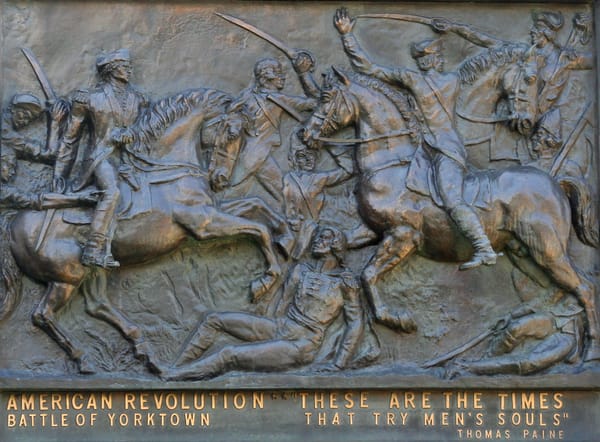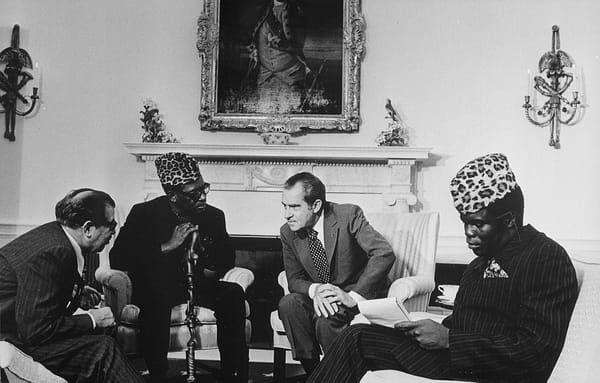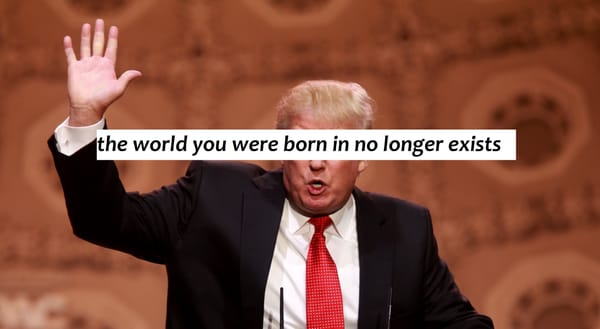You Were Right, Dad, About the Crisis of Authority in the New Millennium

When you’re a kid, authority isn’t the stuff of political theory, it’s a feature of the landscape. A natural characteristic. Parents and teachers and some other adults have it. They also seem to know everything there is to know, as if adulthood means getting let in on all the same secrets. But when authorities contradict each other, cracks start to appear in this imagining of knowledge and the social world.
In my case, it was less that cracks began to gradually form, as that my dad took a hammer repeatedly and regularly to it. This usually took the form of telling me something my teacher had taught me was just wrong, especially if it was a history teacher. “But you should put what they said on your test,” he’d say, after trashing their telling of some episode in history. This only made things more uncomfortable. Not only was he challenging my teacher’s authority in the sense of expertise, but he was giving a pretty cynical picture of their authority in the sense of having a say over my future. Meanwhile, I didn’t have the experience or knowledge to adjudicate who was right about the actual history.
When I retell this story to him now, my dad tells me that I drew the right conclusion from this tension—which is that I needed to be able to live with uncertainty, as all adults do, and to make my own judgments. But a strong part of me suspects that guiding me to a better understanding of authority and individual responsibility was not his actual goal that the time. I’m pretty sure he just thought my teachers were wrong, and like any member of our family, he wasn’t going to keep quiet about it.
For those of you who are unaware, I’m Adam Gurri, the editor-in-chief here at Liberal Currents. And whether or not he meant to problematize my naive understanding of authority back then, my dad, Martin Gurri, has quite a lot to say about authority now, in the second edition of his book, The Revolt of the Public and the Crisis of Authority in the New Millennium.
The story of how the second edition, with an actual print run, came about, is in many ways the story of the transition from the heady days of 2011’s mass protests, to the fear and partisanship of 2016’s populist surges in the West. It was the former that he had in view in 2014, when he was sending me Microsoft Word files of the drafts of each chapter of the first edition. I read these largely on my phone, during my commute, sending him little copy edits as well as my thoughts.
My dad’s interest in 2011 made a lot of sense to me at the time. Ten years earlier, I had followed him into the blogosphere with a youthful idealism about its prospects. In 2004 and 2005, my dad saw the global blogosphere as a source of intelligence, which was his job, as a media analyst at an outfit that moved around within the government during his career, but was originally within the CIA. He and his coworker, friend, and general partner-in-crime Tony Alcott attempted to drag the lumbering edifice of media intelligence into the 21st century. Their efforts were frustrated by the mindset of an intelligence community which romanticized information that was secret rather than actionable. Persuading such an institution to accept an analysis which cited a blog, when the blog might have been called something like “The Rantings of a Sandmonkey,” was next to impossible.
In his book, my dad relies on Walter Lippmann‘s novel definition of a public: “not a fixed body of individuals” but “merely the persons who are interested in an affair”. In 2004 the blogosphere was teeming with publics, pursuing numerous affairs. As a 19-year-old, I joined some of these publics myself, spinning up a garish Blogger page from which to participate in the controversies of the day. The affairs I was interested in were primarily political, but I was also deeply involved in debates over the future of media, which at that time took the form of bloggers vs. journalists.
Like the mutinous public of my dad’s book, I had an intense desire to see the “mainstream media” smashed to pieces. Unlike the nihilism he analyzes, however, I had a positive vision—albeit a rather naive one. I believed that the public could replace the press entirely; I unironically bought into the “citizen journalism” movement and saw myself as very much a part of it. Economists with their own blogs would replace financial journalists. Bridge bloggers would replace foreign correspondents. A networked republic of free individuals would replace professionals entirely.
Alas, this network-utopia of citizen journalists was not to be. Instead, after a period of intense crisis in which many major news organizations were shuttered, institutional journalism has arguably gone through a cycle of tremendous revitalization. The most successful bloggers have followed paths much like Nate Silver’s and Ezra Klein’s: first being called up to the major leagues as a writer at an established publication, then going on to spearhead digital-only publications of their own. The abandonment of the objective style of writing, coupled with an active and critical public to which writers must constantly answer, has given the whole ecosystem an overtly partisan flavor that the old media system avoided—or hid, depending on who you ask—by design. The explosion of partisan fervor in the wake of the 2016 election has transformed the surviving old media outlets and given them new life. Whatever one thinks of these developments, it’s clear that organized and professional journalism has adapted to the new environment, rather than being replaced by amateurs.
Feeling burned out on my idealism of a decade prior, and moving away from the way of thinking that had led me to it, I was skeptical at first of the theory chapter of my dad’s original edition. “Maybe you can cut that down or just leave it out, show your point of view in the specific analyses,” I suggested. “It’s sort of the whole point,” he gently pushed back. He must have wondered why I would think a chapter entitled “My Thesis” could simply be removed.
Once editing was done, he self-published the book in the Kindle store. After an initial push to promote it on both of our parts, it seemed, by the end of 2014, that it would end up just mildly more successful than some of our other online forays.
There are few things more frustrating than realizing your dad was right, but not only was his thesis correct: I was wrong to think the book’s story was closed in 2014. In December of 2015, Virginia Postrel would publish an interview with him about the book to highlight the clarifying power of his framework. Postrel was the first to frame the book as an explanation for Trump in particular. In hindsight, she was remarkably early in saying so; Trump, though the frontrunner, was not yet the nominee, and many still felt comfortable dismissing the possibility as too absurd to merit consideration. The Brexit referendum, another imponderable, was still six months away. The attention drawn by Postrel’s interview snowballed as the desperation to explain the events of 2016 reached new heights, resulting in my dad’s indie e-book getting a second edition, with a publisher and a print run this time.
But popularity isn’t what changed my mind. In the end, I have to say you were right, dad—just as you undermined my teacher’s authority with me years ago, so today does a public in revolt undermine authority everywhere in a similar manner. The public does so by calling attention to wrongs, again and again and again, until “failure sets the agenda” and trust in any leadership crumbles.
My dad had watched the development of media more carefully and with a greater appreciation of the stakes than I was capable of as an idealistic college kid. One result is a key concept in the book, which transcends the blogger vs. journalist or amateur vs. professional dualisms: the overall information sphere with its tremendous redundancies and complex interrelations. This plays an important part in how he explains, for example, the role of social media in the fall of Hosni Mubarak in Egypt. Proponents of the idea that the Tahrir Square protests were caused by social media point out, as my dad does, that it began with a Facebook event created by a group that had gone up to show solidarity with a young man abused by thugs of the Mubarak regime. Critics, such as Evgeny Morozov and Malcolm Gladwell, point out that the biggest crowds didn’t show up until after the regime had shut off the Internet. My dad’s reply relied crucially on the idea of the information sphere, “which has absorbed old and new media alike”:
The dominance and influence of Al Jazeera’s coverage of the Egyptian uprising has probably been exaggerated, but there’s no question that the channel exemplified to many observers the power of the information sphere. The regime certainly felt this way. Its agents dropped Al Jazeera’s signal from the Nilesat satellite, and orchestrated the physical intimidation of Al Jazeera staff in Egypt. These efforts collided with the redundancy factor and came to nothing. Other Arab channels offered Al Jazeera space on their satellites, and much of Al Jazeera’s footage came from amateurs who could not be shut down or intimidated.
The channel kept the story of the uprising alive by streaming it to every corner of the globe. (…)My guess is that Al Jazeera was instrumental in framing the event to the world as a struggle between idealistic youth and a vicious thugocracy. It led Western public opinion—including, it may be, in the White House—to a tipping point favoring the end of Mubarak’s reign, despite real fears about the consequences of instability in the cradle of the Muslim Brotherhood.
YouTube amplified this sentiment, re-hosting video from Al Jazeera and other broadcasters, as well as raw footage from cell phone cameras which somehow found a path to the web. Unlike TV or live streaming, YouTube could select the most visually dramatic moments, and make them searchable. It archived spontaneity: a defiant young man suddenly gunned down by security forces, a bizarre horse and camel charge by Mubarak supporters into the crowd at Tahrir Square.
Virtually all YouTube videos favored the protesters. In the aggregate, the result was a brilliant exercise in geopolitical persuasion, wholly uncoordinated, but the more authentic and effective because of that.
In 2014 I found the chapter on the “phase change” of 2011 extremely fascinating. It was still so recent then and yet it became clear I had known hardly a thing about what had happened. It also contains a passage which is a personal favorite, in which my dad’s otherwise carefully even-handed tone tips into contempt:
The Egyptian public had endured 30 years of Hosni Mubarak. The indignados at Puerta del Sol had suffered a loss of future prospects because of the severity of the economic crisis. In Israel, the public’s existential challenge to the established order came because Leef had found it unendurable to lengthen her commute.
This is more like my dad as you will encounter him in conversation. The Cuban style of discourse does not involve much in the way of detachment or pulling your punches, and in my family this style was cultivated with great joy on all sides. This is why pronouncements from my history teachers stood little chance of remaining uncontested.
The tone of the original edition was different from what I would expect of my dad in another way. While it has nothing on the primal howls that dominate our current public discussion, its chapters still convey a great deal of alarm. In 2014 he felt like a lone voice in the woods, watching Nightmare at 20,000 Feet-style as liberal democracy was placed in increasing jeopardy but no one noticed. Long before the new edition, however, his preoccupations became commonplace, and the tone of the new chapter reflects this; unflinching in its survey of the situation on the ground but nevertheless attempting to coax us collectively back from the ledge. This is far more characteristic; as an immigrant from a tyrannical regime and a student of history, my dad is quick to put seemingly frightening events into perspective.
I have little to add to the discussion of the titular revolt. It has been examined from every conceivable angle at this point, and its current relevance is precisely what has launched my dad’s book into a second edition with a print run. But what is nearly lost in this focus on the revolt is a matter which, while impossible to treat separately, nevertheless deserves an equal share of our attention: the crisis of authority.
The new edition, in tracing what has happened since the first, pays special attention to this crisis. The image of Charlottesville police standing by as disaster unfolded on their watch stands out as emblematic. At the infamous Unite the Right rally, police outnumbered both protesters and counter-protesters combined—it wasn’t even close. Yet they did nothing. The official report on what happened is merciless; the police and especially the top political leadership in Charlottesville lacked the confidence or the courage to do their jobs. They feared that intervention would make things worse, and ultimately placed the police’s own physical safety before their duty to keep the peace.
It bears repeating that this was no Tahrir Square in Cairo, where vast numbers of protesters filled the streets. The civilian groups were small in number and the police were very large in number, having drawn from a pool extending beyond Charlottesville’s own force, specifically assembled in anticipation of the march. Once more: against a small number of untrained though aggressive civilians, a large number of trained, armed, and organized police lacked the confidence to take control of the situation. This story would have been a farce had it not ended in tragedy.
This constitutes an extreme point in the decades-long process of bleeding away the “authorizing magic of legitimacy” on the part of the “modern” or “industrial” state, as it is described in the book. The institutions of this state stand now like the police in Charlottesville: heavily armed, well staffed, hierarchically organized, yet paralyzed in the face of the foul temper of a mutinous public. Leviathan towers taller and more muscle bound than ever, and perhaps for that reason seems capable of nothing more subtle than the most tepid or most overtly aggressive of actions. We therefore see the incapacity of the Charlottesville police mirrored in the capitulation of the Boston police, who gave up the city for a day and rolled out some tanks—and why do police have tanks?—because of two young men with homemade bombs. Neither city offers a model of what institutionally healthy authority ought to look like.
If the heart of the original edition was a plea to take the revolt of the public and its implications for liberal democracy seriously, the heart of the expanded new edition is an invitation to imagine a way out of the crisis of authority—again, for liberal democracy in particular.
In a nation like ours, so steeped in John Locke and Adam Smith, we are all too tempted to approach this matter theoretically. But the question of revitalizing a healthy liberal-democratic authority is not one that can be resolved in the manner of political theorists debating the exact parameters of a just war. The breakdown of democratic authority is no abstraction. In Cuba, where my dad was born, civilian government run by democratically elected leaders was tried again and again. Ultimately each experiment in democracy was unable to stand up to whoever managed to establish their authority with a far more limited constituency: the military. Batista carefully maintained the loyalty of the military for many years and exerted an undemocratic influence on Cuban politics long before seizing control outright. And Castro built up his own military force abroad and imported them. Military authority alone proved the only hearty reed as a basis for Cuban governance. Avoiding extreme outcomes like these means wrestling with how they come about in the first place, and actively pursuing alternate paths.
The conditions of the public’s revolt are likely here to stay. What the new edition invites us to consider is not how to end this revolt, but how to live with it: How the institutions of authority, and our leadership class, might be changed in order to truly govern again in the new informational landscape. How to do what Charlottesville police would not, and under less favorable circumstances. How to handle more dangerous threats than the Boston police, and with a steadier hand.
With the second edition’s release, you will be hearing a great deal about The Revolt of the Public in the coming months. What I suggest you do, in each case, is to take care not to lose sight of The Crisis of Authority.
Featured image is of protesters in Tahrir Square, February 9, 2011.




